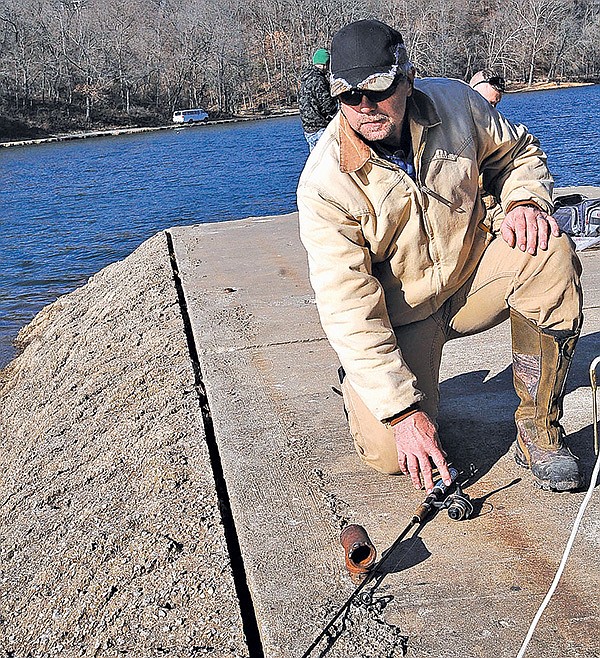Rogers’ Lake Atalanta Ecological Study Complete
STAFF PHOTO FLIP PUTTHOFF Jeff Overturf checks his fishing rod Friday hoping to catch some trout at Lake Atalanta in Rogers. The Arkansas Game & Fish Commission stocks the lake with trout each winter.
Monday, February 17, 2014
ROGERS — A second ecological study of Lake Atalanta garnered mixed reviews from people who have expressed concern about a lake renovation project.
A study done in November by Theo Witsell, a botanist with the Arkansas Natural Heritage Commission, focused on on the plants contained in the park.
The second study was done by FTN, water resources/environmental consultants, and focused on the karst (cave) system, springs, plants and animals around Lake Atalanta. The study was done in December and January.
At A Glance
Lake Atalanta Study
An FTN study found:
The impact of the project will be limited and minor.
Improvement to Prairie Creek, within the park north of Walnut Street, would benefit aquatic species, creating varied habitats, such as pool, riffles and runs.
Bike and hiking trails would have minor impact.
Trail density near the head of Frisco Springs could be an issue because of the steep slope.
Source: Staff Report
At A Glance
Project Features
Rogers officials expect to spend $17 million on the Lake Atalanta project. Plans include:
Prairie Creek improvement
Boardwalk
Channel stabilization
Hiking, biking trails
Walnut Street improvement
Bike park
Amphitheater, observation tower and parking area
Dredging the lake
Source: Staff Report
Web Watch
To read the FTN study, go to www. nwaonline.com/docum….
Some residents said they were pleased with the Witsell study the city paid for, but believed a second should be done to address the impact the renovation would have on the lake and park area.
“Anytime soil is disrupted, it will have an impact on an area,” said Travis Scott, an engineer and project manager with FTN. “We determined the impact for the projects planned for the renovation of Lake Atalanta would have a minor impact on plants, animals and the underground karst system that feeds the recharge area of the springs in the park.”
Joe Neal, a retired biologist who lives in Fayetteville, read the report and doesn’t agree with Scott or the report.
“You have to remember, these people are paid by the city to compile the report, this is how they make money,” Neal said.
“The first thing city officials should think about is to do no harm. I don’t think they are doing that. An expert in karst areas and springs should be called in to conduct a proper study before the city does anything around the lake,” Neal said.
“There is no federal or state law that mandates the city must conduct an ecological assessment of Lake Atalanta before moving forward with construction,” Scott said. “City officials are going beyond due diligence.”
Neal said he “assumes” there are Ozark cavefish in the area.
“The FTN study eliminated almost all of this, which allows them to avoid dealing with Ozark cavefish, probably to the great relief of the Rogers officials,” Neal said.
The Ozark cavefish is a small freshwater fish listed on a federal threatened species list. Its existence has caused changes to major projects in Northwest Arkansas over the years.
Scott said FTN has done work in and around Lake Atalanta since 2012.
“We have not seen any evidence of cavefish. One of the top biologists in the state assisted in this study, as did a geologist and a karst expert. The findings were reviewed by senior staff members who have between 20 and 30 years of experience. I stand by the report,” Scott said.
Strad Will, a member of a committee helping formulate the renovation plan, said he thinks the report is fairly well balanced.
“I don’t think it’s biased in anyway,” Will said. “The city wants to keep the park as natural as possible.”
Dredging the lake, one of the major projects, is necessary, Will said.
“The city has to get a permit from the U.S. Army Corps of Engineers to dredge the lake. The city will have to jump through a number of hoops to get the permit. Everything regarding the dredging must be done to corps standards and environmental issues met,” Will said.
Steve Glass, city director of planning and transportation, said he isn’t surprised by anything in the report.
“The report gives us the ability to more forward. It should put many people’s minds at ease that due diligence has been done on the renovation project,” Glass said. “I know some people will still want more studies done, no matter what we say or do.”
More bird and animal studies will be done in the spring to ensure city officials are aware of the different habitats and how the habitats might be impacted during and after renovation, Glass said.
Scott said there’s residential development in the area that also impacts the springs and lake.
“The effluent from septic tanks used in some areas around Lake Atalanta leech into the soil and end up in the springs. Another subdivision near the lake would have a far greater impact on the lake than the projects planned for renovation,” Scott said.
More than 30 people who voiced opinions about the project on the city’s Facebook page were contacted Thursday asking for comment. None responded.
